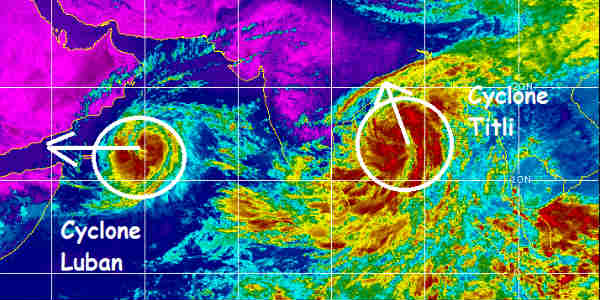
The post-Monsoon cyclone season kick started on active note, with the first month itself witnessing twin cyclones simultaneously. While Cyclone Luban has kept Arabian Sea active, Bay of Bengal has also been dynamic with the arrival of Cyclone Titli.
All thanks to the active ITCZ (Inter Tropical Convergence Zone) has now also started shifting southwards towards the coast. This is the main generator behind the disturbances in the open waters. As per weathermen, Indian seas are the deadliest basins for the formation of severe cyclonic storms during this time of the year. Both the systems have been off shoot of this ITCZ only.
Besides this, MJO (Madden-Julian Oscillation) is also presiding in the close proximity of Indian Ocean and is likely to visit the Indian waters soon. This has also been providing favourable weather conditions for the enhancement of any cyclogenesis between October 6-12. Occurrence of two cyclonic storms simultaneously is not very rare but not impossible also.
Cyclone Luban had covered long sea travel and have been sustaining the strength of cyclonic storm for last five days. Despite the cold waters, Luban continued to intensify into a severe cyclonic storm.
In comparison to this, Cyclone Titli has a small sea travel and would sustain its strength for mere 36 hours only in view of approaching land mass.
According to weathermen, any system forming in Bay of Bengal in October would eventually head towards Indian Coast, while Arabian Sea offers a lot of options for the tropical storm, right from Yemen, Oman, Somalia to Pakistan or Gujarat.
Please Note: Any information picked from here must be attributed to skymetweather.com




